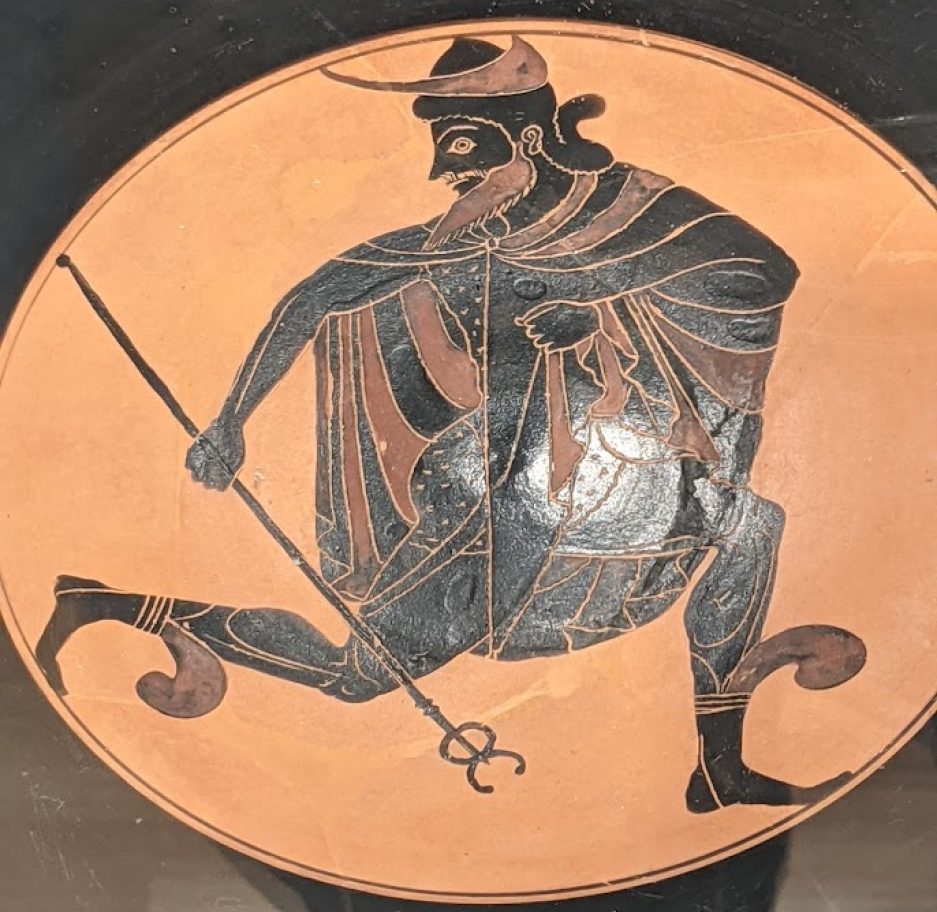May Deimos rise and rage against the host,
With Phobos bring to naught their every boast;
The Dread of battle fill the coward’s heart,
Till Fear cause him to rend his friends apart.
The victims of his sons shall Ares mock,
As slaves and weaklings of unworthy stock.
The man that flees, the same shall be cut down,
And in his blood he’ll wallow, choke, and drown.
As Dionysus loves the taste of wine,
On blood shall Fear and Dread delight to dine.
Where law to chaos leaves its place and yields,
There Ares’ sons shall sow their fruitful fields.
The dead shall lie for birds of prey to eat,
When all the foes shall lie down in defeat.
The house of Hades shall be duly filled,
When men by savage butchery have spilled
The blood of those whom Terror seized with fright,
Who were hewn down in Ares’ dreadful sight.
Month: October 2021
Eos
The shining Eos, rising when the Night
Forsakes her place, with dazzling rays of light.
Hyperion, the Titan, was her sire,
Who with far shining Theia birthed the fire
Of morning light, the Dawn that breaks the day:
Then Eos rises in brilliant display.
Eosphorus and the four winds were born
By her, the rosy goddess of the morn.
She goes before her brother at the break
Of day; he drives his chariot in her wake.
The men who lived before, she sees them dead,
And rises o’er their progeny instead.
So, smiling daily does the Dawn arise,
And blushing paints she all the eastern skies.
Nike
O Nike, daughter of the god of war,
From storied heights you, goddess, ever soar!
The fame the hero has after he’s fought
And won the battle can never be bought;
From you it comes, the wreath of laurel leaves;
Such fame can comfort even he who grieves
For valiant men, who’ve fallen on the field:
Their deeds survive in word, and glory yield.
Achilles still slays Hector in his rage,
Unable still his sorrow to assuage
For Patroclus; and Ajax, on his sword,
Falls, for that he received not the award;
Odysseus shows himself the winner,
Making a bloodbath at the suitors’ dinner.
These had victory from you for warlike deeds,
And all their fame yet further glory breeds.
The victory of battle is your trust,
Awarded to the best side, as is just.
Orpheus and Eurydice
The joy of a marriage turned to despair,
Which music, though sweet, could never repair.
Eurydice danced with nymphs in the field,
Where serpents their poisons as weapons wield;
A snake in the grass bit her, and she died;
No cure for the poison could be applied:
And Orpheus mourned, consumed by his grief,
No beautiful sound or sight gave relief:
He charmed the world when he played on his lyre;
His songs had power to please and inspire.
So, he determined to go to the dead,
Not fearing the deep, with courage he tread
To Tartarus where Hades holds his court,
With Persephone, his cherished consort;
There was Cerberus, great Hades’ own hound
Beguiled by the sweet and lyrical sound;
So passed he among the ghosts of the deep,
Whoe’er heard his songs ceased promptly to weep.
At last, he arrived and stood before he
Who ruled this realm as the chief diety;
And Orpheus played his lyre for the king,
With skill did he play, with grace did he sing.
And Hades was pleased, and told Orpheus
His wife could return, only if he did thus:
He must go ahead of her, his true love,
And never look back till they were above,
Only when both had returned to the light,
Could he look back, and behold with his sight
His wife. And Orpheus was delighted,
Agreeing at once, the two alighted.
And Orpheus looked ahead with his eyes,
He kept the command and didn’t despise
The lord of the dead. He emerged from the cave,
But then he did something fatal and grave;
Though Eurydice still had not emerged,
He desired to see her, and his heart urged
Him, so that he turned and saw with his eyes
The woman he loved, and instant she cries
“Goodbye”. She faded, returning below
To the land where Styx and Acheron flow,
And Phlegethon and the Cocytus too:
And there was nothing at all he could do.
Lost to the living, he saw her no more,
Down like a river did all his tears pour;
To the underworld, he could not return,
No matter if love did in his heart burn:
So he sat and he played a mourning song,
Until he was found by a Maenad throng;
The followers of the son of Zeus raged
In divine frenzy, they could not be assuaged:
They tore him to pieces, such was his end,
But still for his music do men commend
His name; and the Muses took up his head,
And still did it sing after he was dead,
So that through the Earth, his music still flew,
Soothing and beautiful, gentle and true.
Hephaistos
The god of the forge, Hephaistos, who makes
Such armour as never changes or breaks;
He fashioned the aegis Athena bears,
As well as the sandals that Hermes wears;
The first for the goddess of truth and right,
The second for he who flies faster than sight;
And also Achilles’ armour he made
(The hero reduced Hector to a shade).
The gift of the god is the craftman’s skill;
By him much blood can the warriors spill;
By him was Venus with girdle arrayed,
And also all women who have displayed
Their charms with help of finery rely
On he whose skill can such good things supply.
Though lame, by his good, he renders to Zeus
Such works as the gods can put to good use.
And so, wherever, the craftsman is found,
There also Hephaistos’ good does abound.
